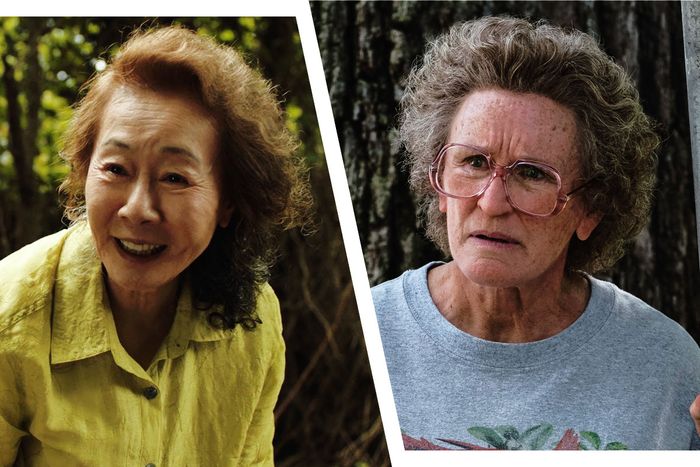
One of the things that make the Academy Awards so fascinating to follow, year in and year out, is the fact that Oscar voters have tendencies that they return to again and again. The taste levels of 8,000-plus voters are incredibly difficult to get a grasp on, especially with new members being added every year, but if you look at the history of the Oscar nominations, trends and tendencies do emerge. The Oscars really love it when actors embody real people (Daniel Kaluuya in Judas and the Black Messiah this year; Renée Zellweger in Judy last year). They can’t get enough of movies about Hollywood’s history (Mank). They love Meryl Streep (maybe not this year, but she’ll be back). They especially love sentimentality and movies that tell an important story with an emotional component—which is why it’s so strange that in the 90-plus years of Oscar history, the Academy has hardly ever nominated actresses playing grandmas. This year, though, that trend changed sharply, with both Glenn Close and Youn Yuh-jung nominated for their grandmotherly performances in Hillbilly Elegy and Minari, respectively.
In the Best Supporting Actress category specifically, by far the dominant trend throughout Oscar history has been to nominate actresses playing mothers or wives. Part of this is that the nature of supporting performances is to augment the story of the main character, so they’re often defined in relation to that main character: wives, mothers, friends, antagonists, and lawyers all fit the bill. And since Hollywood loves to tell a story about a man, the supporting characters are often the women who take smaller roles in that man’s story. (Yes, it’s annoying. Yes, we wish it were different too.)
Historically, the majority of Supporting Actress nominees (especially lately) tend to be mothers of female protagonists (Allison Janney in I, Tonya; Laurie Metcalf in Lady Bird), which is rad if only because it means that the Oscars are paying attention to movies with female protagonists. And frankly, with that in mind, you’d expect there to be a good number of grannies in the Supporting Actress ranks through the years, too. After all, Hollywood loves a good, irascible grandma character, stealing scenes and melting hearts while the main characters go about their business. But actually … no. Not at all. Close and Youn’s nominated performances are not only two of the very few nominated grandmas ever, but if either of them won, they’d be the first ever Best Supporting Actress to win for playing a grandma character … ever.
This doesn’t mean that no grandma-age actresses have ever been nominated for Best Supporting Actress, of course. But June Squibb’s nomination for 2013’s Nebraska came for playing a wife and mother to Bruce Dern and Will Forte’s characters, respectively. Ruby Dee snagged an American Gangster nomination for a role in which her primary function in the story was as Denzel Washington’s mom. Gloria Stuart holds the record for the oldest Best Supporting Actress nominee at 87 years old, but while her Titanic character may indeed have been a grandmother (Suzy Amis played her granddaughter, who accompanied her onto Bill Paxton’s ship), that’s not really the point of her role in the film.
There are some similarly blurred lines if you look at the Best Actress nominees through the years. Meryl Streep’s August: Osage County is the family matriarch, and that family does include her granddaughter, played by Abigail Breslin, even if the focus of the film is on Streep’s relationship with her daughter, played by Julia Roberts. Helen Mirren won the Oscar for 2006’s The Queen, playing Queen Elizabeth II, who is indeed a (very royal) grandmother, but her relationship with her grandchildren isn’t more than tangentially related to her character’s arc in the film.
You definitely can’t say that about Glenn Close as Hillbilly Elegy’s intrepid Mamaw, who, whatever you might think of that incredibly poorly reviewed yet Oscar nominated film, is Grandma as hell. It’s fitting for Close, since over the course of her seven previous Oscar nominations, she’s seemingly played all of Oscar’s favorite types: a wife in The Wife (natch), a mother in The World According to Garp, a villain in Fatal Attraction, a supportive good woman back home in The Natural. Perhaps if she wins, this will set off a trend of actresses taking grandma roles and running with them, all the way to the Oscar stage. Or maybe that will be true of Youn Yuh-jung, whose performance as Minari’s Soonja is not the stuff of typical granny roles. Soonja isn’t warm or cuddly, and even in her un-grandmotherliness she resists treading into “hip, cool granny” territory. She and Alan Kim’s young David wage low-key warfare with each other for a while, before arriving at a hard-won closeness.
Youn’s performance especially has helped to make this a banner year for grandmas at the Oscars. And perhaps her and Close’s nominations provide a bit of justice for the Oscar-buzzed grandma roles who never got nominated. Cloris Leachman got a SAG Award nomination for her role as a blunt, acerbic grandma in James L. Brooks’s largely unsuccessful Spanglish, but the former Best Supporting Actress winner (The Last Picture Show) was denied an Oscar nod. Shirley MacLaine gave a tremendously warm and wise performance as grandmother to Toni Collette and Cameron Diaz in In Her Shoes but never got closer than a Golden Globe nomination. Just last year, The Farewell’s Zhao Shuzhen seemingly came incredibly close to an Oscar nod, and actually won the Independent Spirit Award, only to be left off the Oscar ballot. Grandmas, historically, could not catch a break with the Academy. But maybe this year will be different. Maybe this year, Academy voters will finally do something nice for their grandmas.




